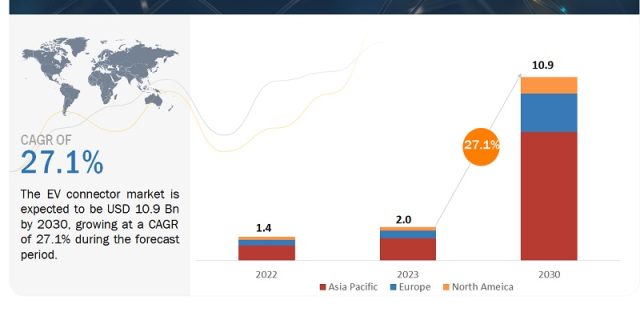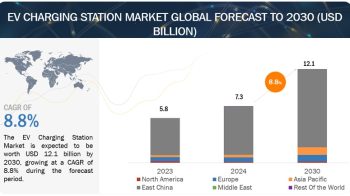
The global EV connector market is projected to grow from USD 2.0 billion in 2023 to USD 10.9 billion by 2030, registering a CAGR of 27.1%. Increased awareness about environmental concerns and the desire for sustainable transportation options are driving consumer interest in electric vehicles. Also, the global EV market is experiencing explosive growth, fuelled by government incentives and advancements in battery technology. This surge in EV production directly translates to a higher demand for EV connectors in the electric vehicle.
Advancements in infotainment systems and in-vehicle connectivity
Consumers expect a seamless and interactive driving experience, which has led to the integration of advanced in-vehicle connectivity features that include touchscreens, multimedia interfaces, navigation systems, and internet connectivity. EV connectors play a vital role in facilitating the electrical and data connections necessary to power and interconnect in-cabin systems. As electric vehicles evolve to become not just modes of transportation but connected environments, the demand for EV connectors capable of handling high-speed data transmission and supporting diverse in-vehicle communication networks continues to rise. In addition to in-vehicle connectivity, the demand for advanced infotainment systems contributes to the growing need for EV connectors in electric vehicles. Infotainment systems comprise a wide range of multimedia features, including audio systems, video displays, and smartphone integration. Connectors enable the seamless integration of these components, supporting the efficient transmission of power and data. As consumers seek more personalized infotainment experiences in their vehicles, manufacturers are challenged to incorporate innovative technologies, supporting the demand for EV connectors that continue with the evolving requirements of modern EV infotainment systems.
Request Free Sample Report @ https://www.marketsandmarkets.com/requestsampleNew.asp?id=59111615
Growing incorporation of Electrical/Electronic (E/E) architecture
The Electrical/Electronic (E/E) architecture serves as the intricate network of electrical and electronic components and systems that govern the functioning of the electric vehicle. E/E architecture in electric vehicles is particularly complex due to the unique characteristics and requirements associated with electric propulsion systems, such as battery management systems, thermal management systems, and motor controllers, among others.
The advancement of E/E architecture, driven by trends such as electrification, connectivity, autonomous driving, and advanced driver assistance systems (ADAS), has increased the complexity of in-vehicle networks and electronic systems. This has generated the need for EV connectors to support high-speed data transfer for reliable communication between electronic components, whereas high-voltage connectors are required to transfer power between the vehicle’s batteries, motors, and other electrical components. Sensors for various applications, including environmental monitoring, parking assistance, and collision avoidance, create opportunities for EV connectors to accommodate diverse sensor technologies used in modern electric vehicles.
Asia Pacific is the largest market for EV connectors during the forecast period.
The Asia Pacific region is projected to be the largest EV connector market by 2030. Asia Pacific leads the global EV market, with China alone accounting for more than half of global EV sales. This rapid adoption, driven by government incentives, rising fuel costs, and increasing environmental awareness, fuels the demand for EV-specific connectors. Leading automotive manufacturers in this region, such as Toyota Motor Corporation (Japan), Honda Motor Co., Ltd. (Japan), and Hyundai Motor Company (South Korea), are leveraging the growth of EVs in the region. As of April 2023, Toyota aims to launch ten new battery electric vehicle models by 2026. In electric vehicles, EV connectors enable safe, efficient, and reliable operation by performing several functions, such as power transmission, data communication, safety, and others. Thus, the growing number of EVs in the region will support the market growth of EV connectors.
Key Market Players
The EV connector market is dominated by established players such as TE Connectivity Ltd. (Switzerland), Aptiv PLC (Ireland), Yazaki Corporation (Japan), Molex LLC (US), and Sumitomo Electric Industries Ltd. (Japan).
Inquire Before Buying @ https://www.marketsandmarkets.com/Enquiry_Before_BuyingNew.asp?id=59111615

